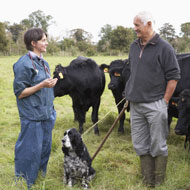TV vet triggers debate on working hours

Julian Norton claimed fewer young vets want to work in mixed practice due to the longer hours and lone working. (stock photo)
TV vet Julian Norton has sparked debate among the veterinary profession by claiming fewer young vets want to work in mixed practice due to the longer hours and lone working.
Speaking to the Daily Telegraph he said: “People are turning to surgeries where there are more cats, dogs and rabbits, as there is a general perception that a small animal job is easier.
“There are often less out-of-hours complaints, you don’t have the 2am cow to calve and you don’t have to spend three hours in the mud and rain. In mixed practice, you have stretches of 19 days without a day off and 11 nights on call, rain lashing down. People don’t want to do that anymore.”
Mr Norton, who appears in the TV series The Yorkshire Vet, which is based on James Herriot’s old practice in Thirsk, North Yorkshire, claims a recent opening at the practice attracted only 10 replies, whereas a few years ago, at least 50 applications would have been expected.
The remarks have prompted debate about working hours and support for new graduates. Liz Mossop from the University of Nottingham tweeted: ‘Inferring that new grads should see working 19 days in a row as “normal” is not helpful. Does anyone think this good for patients?’
Sarah Voss from the University of Glasgow said clients have moved on to wanting species-specific opinion, rather than a ‘Jack of all trades’.
Padraig Egan commented: ‘The profession needs to evolve. James Herriot was a different era. Young grads need support!’
Others argued that the decline in graduates opting for mixed practice is down to a lack of available jobs. Mark Bowen tweeted: ‘Young vets don't want to work in mixed practice. Which is good as very few jobs out there for them.’
A recent graduate from the University of Bristol told the Telegraph that the majority of her year went into small animal practice because there is much wider job availability within the field. “It should be noted that true ‘mixed’ practice is now very far and few between,” she added.
BVA president Gudrun Ravetz said a 2015 survey suggests 43 per cent of veterinary students nearing graduation would consider working at a mixed practice, but young vets are no longer staying in rural or mixed practice roles. Issues include the isolation of rural areas and working longer hours than at larger practices.
“I think the challenge is how do we help these small practices to provide those things that graduates rightly need? We need to understand the value of vets and value of the services they provide because we can’t continually have vets working excessive hours.”



 FIVP has shared a survey, inviting those working in independent practice to share their views on the CMA's proposed remedies.
FIVP has shared a survey, inviting those working in independent practice to share their views on the CMA's proposed remedies.